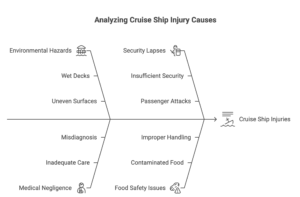Dreaming of a cruise? Sun, sea, and relaxation, right? Unfortunately, accidents happen, and what should be a blissful escape can turn into a nightmare. If you’ve suffered a cruise ship injury, you’re likely wondering about your rights and how to seek compensation. This guide will break down cruise ship injury law, providing you with actionable steps to take.
Understanding Cruise Ship Injury Law
When you step aboard a cruise ship, you’re essentially entering a floating city. Cruise lines have a responsibility to ensure the safety of their passengers. The cruise ship injury law exists to protect individuals who are hurt due to the negligence of a cruise line. This area of law can be complex, often involving maritime laws and specific contractual clauses in your ticket.
What Constitutes a Cruise Ship Injury?
A cruise ship injury can encompass a wide range of incidents. Here are some common examples:

- Slip and Fall Accidents: Wet decks, uneven surfaces, and improperly maintained walkways are frequent culprits.
- Medical Negligence: Inadequate medical care, misdiagnosis, or delays in treatment by the ship’s medical staff.
- Assault and Battery: Insufficient security leading to passenger-on-passenger or crew-on-passenger attacks.
- Food Poisoning: Contaminated food or improper food handling can lead to widespread illness.
- Swimming Pool and Water Park Injuries: Lack of proper supervision or maintenance in recreational areas.
- Shore Excursion Accidents: Injuries sustained during excursions organised or endorsed by the cruise line.
Navigating Applicable Law for Cruise Ship Injuries
The fine print of your cruise ticket often dictates which laws apply. Many cruise lines include clauses specifying that claims must be filed in a particular court, usually in Miami, Florida. This is because many cruise lines are headquartered there. Additionally, your ticket contract likely contains a statute of limitations, limiting the time you have to file a claim, often shorter than the standard statute of limitations for personal injuries on land. Understanding these details is vital, as missing deadlines or filing in the wrong location can jeopardise your case.
Proving Negligence in a Cruise Ship Passenger Injury Case
To receive compensation, you must demonstrate that the cruise line was negligent, meaning they failed to exercise reasonable care, and this failure caused your injury. This can involve showing:
- The cruise line knew or should have known about a dangerous condition.
- The cruise line failed to warn passengers about the danger.
- The cruise line failed to take reasonable steps to correct the dangerous condition.
For instance, in a successful case, a passenger slipped on a spilled drink on a dance floor. The cruise line was found negligent because staff failed to clean it up promptly, even though they were aware of the spill. This passenger received compensation for medical bills and lost wages.
Pursuing Compensation: Your Rights After a Cruise Ship Injury
If you’ve been injured, you’re entitled to seek compensation for your damages. This can include:

- Medical Expenses: Costs of treatment, rehabilitation, and future medical care related to the injury.
- Lost Wages: Income lost due to your inability to work as a result of the injury.
- Pain and Suffering: Compensation for the physical and emotional distress caused by the injury.
- Loss of Enjoyment of Life: Compensation for the diminished ability to participate in activities you previously enjoyed.
- Future Earning Capacity: If your injury impacts your future ability to earn an income.
Cruise Ship Injury Claim Timeline and Legal Process
The process of filing a cruise ship injury claim typically involves these steps:
- Report the Incident: Immediately report the injury to the cruise line and seek medical attention onboard. Obtain a copy of the accident report.
- Gather Evidence: Take photos of the accident scene, collect witness information, and keep records of all medical treatment.
- Consult an Attorney: Speak with a qualified cruise ship injury lawyer to discuss your case and understand your rights.
- File a Claim: Your attorney will file a formal claim with the cruise line.
- Negotiation: Your attorney will negotiate with the cruise line’s insurance company to reach a fair settlement.
- Litigation (if necessary): If a settlement cannot be reached, your attorney will file a lawsuit.
Maximising Your Cruise Ship Injury Settlement
To maximise your potential settlement, consider these points:
- Document Everything: Keep meticulous records of medical treatment, expenses, and lost income.
- Follow Medical Advice: Adhere to your doctor’s recommendations and attend all scheduled appointments.
- Avoid Social Media: Refrain from posting anything about your injury on social media, as it could be used against you.
- Hire an Experienced Attorney: Choose a lawyer with specific experience in cruise ship injury claims. Look for someone familiar with maritime law and the cruise line’s practices. A skilled attorney understands the nuances of these cases and can advocate effectively on your behalf. For example, some firms track successful settlements ranging from tens of thousands to millions of dollars, depending on the severity of the injury and the cruise line’s negligence.
By understanding cruise ship injury law and taking the proper steps, you can protect your rights and pursue the compensation you deserve.




